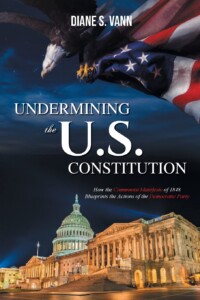Title: Undermining the U.S. Constitution: How the Communist Manifesto of 1848 Blueprints the Actions of the Democratic Party
Author: Diane S. Vann
Publisher: Bookside Press
ISBN: 978-1998784882
Pages: 168
Genre: Non-fiction / Political
Reviewer: Irene Jacobs
Pacific Book Review
Diane S. Vann’s Undermining the U.S. Constitution offers a critical analysis of the parallel universe between political principles and ideologies. Vann navigates the worlds of politics, philosophy, and history to illuminate the intersection between the foundational principles of the U.S. Constitution and the principles set forth in the Communist Manifesto. Throughout the pages, readers are guided through an exploration of how the Democratic Party’s actions are allegedly influenced by the ideological underpinnings of the 1848 Manifesto.
With meticulous research and analysis, the author presents a narrative which challenges conventional perspectives on the Democratic Party’s alignment with historical ideologies. Undermining the U.S. Constitution engages readers in a thought-provoking journey, encouraging them to reconsider the political landscape through a lens which intertwines the past and present. A chronological examination of events, ideas, and political shifts guides the reader through the book’s systematic structure. Commendation is warranted for the meticulous presentation of evidence within the work. A wide array of historical documents, quotations, and references are drawn upon to substantiate claims, enhancing the credibility of the arguments. The utilization of primary sources provides readers with a tangible connection to the historical context explored. The author’s perspective is evident throughout the book, and Vann’s background adds weight to the analysis.
The writing style adopted by Vann is straightforward, making complex ideas understandable to a broad audience. The book excels in conveying intricate political concepts without sacrificing clarity, contributing to its readability and engagement. Furthermore, the relevance of Vann’s arguments to contemporary political discourse is a notable aspect. The connection of historical events to present-day political discussions is effectively established, underscoring the enduring impact of ideologies on American politics. However, the work is observed to lean towards a particular viewpoint, prompting questions about objectivity. While the passion for the subject is palpable, a more nuanced exploration of opposing perspectives is suggested to strengthen the overall argument.
In conclusion, Undermining the U.S. Constitution by Diane S. Vann is a thought-provoking exploration of the alleged influence of the Communist Manifesto on the Democratic Party. Strengths lie in the meticulous use of evidence, accessible writing style, and relevance to contemporary discussions. The work stands as a valuable addition to the literature on U.S. politics, inviting readers to reflect on the intricate interplay of historical ideologies and present-day political actions. This book appeals to multiple audiences because of its broad genres. It gratifies political memorandums, philosophical questions and thoughts, non-fiction enthusiasm, and historical context. All of these make the book a rich reality from which to study.


